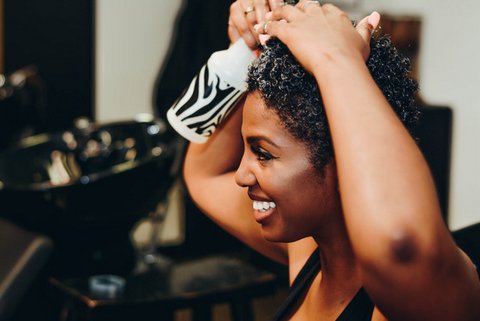
31 Mar Getting Creative to Survive: Barbers and Beauticians Share COVID-19 Stories

Chida Rebecca and Tanu Henry | California Black Media
Across the country, barbers and hairstylists are feeling the effects of COVID-19. In the Black community, the impact is more severe.
Black-owned salons and barbershops have always served as a hub for men and women to congregate and catch up on the latest news, gossip and overall happenings within the community. These “meeting places” of sorts have also proven to be extremely profitable for its owners.
But per executive orders from Gov.Gavin Newsom, all non-essential businesses in California have been forced into temporary closure; among them, barbershops, beauty salons, nail technician shops and other cosmetology centers.
In one fell swoop, the COVID-19 pandemic has caused hairstylists and barbers across the state to go from running lucrative, bustling businesses to owing rent or mortgage on a shuttered commercial space that is now home to an under-performing business with an uncertain future.
A few barbershops and beauty salons in California open up occasionally, observing the federal and state governments’ social distancing guidelines, but others remain completely closed.
“I’m just waiting for somebody to show up and tell me I’m breaking the law,” laughed one Los Angeles-area barber who asked to remain anonymous. Although he sometimes does private bookings for a few of his clients who are celebrities, he told California Black Media he has never had to accept appointments from clients he did not know just to keep earning money.
So, during this crisis, he dons a mask and gloves, goes out and does what he has to do.
“This is a crazy time for everybody,” he said. “And its tough, tough time for our businesses. We just have to ride it out and see what happens.”
Customers are equally upset. Many of them have taken to #BlackTwitter to express their frustration.
“My barbershop is closed indefinitely,” tweeted Anthony Wheeler. “This is the worst result of #covid19.”
Justin Henderson, another Twitter user, wrote, “The barbershop i go to is closed indefinitely and the company I work for wants us to use video chat for every virtual meeting. If this goes on for more than 2 more weeks, I may no longer be recognizable.”
Bridget Winton, a respected San Diego-based hairstylist and salon owner is among the 33,570 cosmetologists in California trying to rebound from the coronavirus effects.
“I’m glad that I have a couple of options to make money,” she said. “I have a direct franchise business offering health, wellness and beauty products that consumers still need even if they don’t come in. For me, it’s a nice little backup. It’s not as much money as I could be making if I’m in the trenches full time, but its steady money.”
Winton, who’s been in the industry for over 30 years says she learned early on the importance of creating multiple streams of income within her company. By turning her salon into a “one-stop-shop,” she has been able to meet many of her clients’ total body needs.
“I’m a full-service salon. I do facials, body treatments, body contouring, skin restoration, along with scalp treatment and hair services,” she said.
When coronavirus began its rapid spread, Winton started to visit which of her “streams” she’d focus on to maintain a flow of revenue. The services that required her to touch the skin would have to stop.
“At first, when all of this happened, I was able to get a few people in and do some hair treatments, but if anybody came to me for skin rejuvenation or body treatments, I wasn’t doing them because I’m opening the pores of their skin and it was just too easy to pass on any germs,” she said.
Fortunately, for Winton and other independent businesspeople in the cosmetology industry, they now have a safety net if they need it. Last week, the U.S. Congress passed the CARES act to help individuals and businesses the Coronavirus pandemic has affected. President Trump signed it into law on Friday. The state of California has also extended unemployment benefits to freelancers and “gig workers,” including all barbers and beauticians.
That means they can now apply to receive a weekly paycheck that ranges between $40 and $450 dollars, depending on their average weekly income, and an additional $600 a week from the federal government.
For now, Winton keeps working on restructuring her businesses to meet her new reality. For starters, she has launched a newsletter to stay connected and keep her clients informed.
“I’m going to be taking my business online and set it up where I can interact with people one at a time, and use that time wisely to educate my clients. I’m in the process of updating my website and cleaning that up,” she said.






No Comments